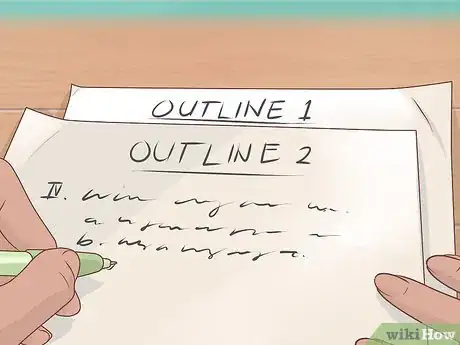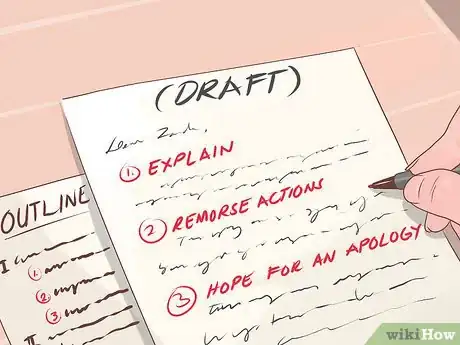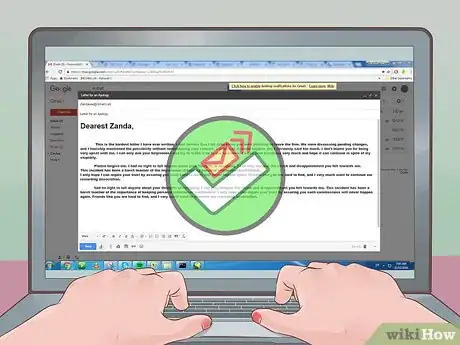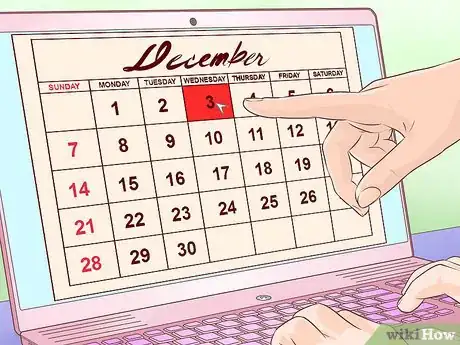This article was co-authored by Paul Chernyak, LPC. Paul Chernyak is a Licensed Professional Counselor in Chicago. He graduated from the American School of Professional Psychology in 2011.
There are 22 references cited in this article, which can be found at the bottom of the page.
This article has been viewed 30,042 times.
Most people have lied about something at some point. Most of the time these lies are small and insignificant, but sometimes you can tell a bigger lie that has some serious consequences. Whether you started with a little fib that has spun out of control, or whether you told a whopper that you just can’t get out of, it can be a tricky thing to extricate yourself from the falsehood. Coming clean and trying to be a more honest person is a laudable impulse, but be prepared for what can be a rocky road to self-improvement.
Steps
Confronting the Issue
-
1Think about why you lied. Take some time to contemplate your actions and question your underlying motivations. It’s not that you’re trying to find an excuse for your behavior, but rather that you’re trying to more fully understand what happened and why. This self-evaluation can help you avoid similar behavior in the future, as well as help the person you’re confessing to understand.[1]
- Talk with a trusted friend who has known you a long time. They might be able to help you figure things out.
- If you see a therapist regularly, you can ask for their help in plumbing the issue. If not, you can try writing about your lie in a journal or self-reflection exercise and see if this gives you any insight.
-
2Identify who should hear your confession. You should tell anyone you may have injured in the course of your lie, as well as anyone to whom you lied.
- Sometimes this is straightforward. For example, if you lied on a job application, you need to tell the recruiting officer with whom you interviewed. Sometimes, though, the issue is less clear-cut: there might be people who you didn’t directly lie to or about, but who were or could be affected by the deception. For example, if you cheated on an exam, you should tell not only your teacher, but also your parents or close guardian who need to be aware of your behavior.
- If there are multiple parties to whom you should divulge your lie, do so on a one-on-one basis rather than grouping them together. This will make it easier for you to be direct and open, and it will also show those to whom you’re confessing that you respect and care enough to dedicate one-on-one time to them.
Advertisement -
3Set a time and date for your talk. Although an impromptu chat can be productive, it’s usually best to assign a special time for your talk. This ensures that you can gather your thoughts ahead of time and avoid problematic distractions like other people’s conversations or work obligations.
- Pick a time when you and the other person can think clearly. This means you probably want to avoid lunch break or the morning hours when people are often preoccupied with work problems.[2]
-
4Choose a neutral location. Sitting in someone’s living room can make it feel like one person has an advantage over the other, so think carefully about the location of your meeting before making the assignation.
- Public places like coffee shops or park benches can be a good idea, but make sure it’s not so busy that you get distracted or feel uncomfortable about talking about personal things in the proximity of strangers.
-
5Maintain eye contact. Looking someone in the eye denotes sincerity and can make a big impact as to how your confession is received.[3]
- It can help to remember that, while you were wrong to lie, it’s a noble act to recognize and admit your wrongdoing. Allow yourself to be proud of your decision and acknowledge its bravery.
-
6Identify your lie. As clearly and concisely as possible, outline the lie you told. Provide a reason or context for the lie if your interlocutor is willing to listen, but make sure it doesn’t sound like you’re trying to rationalize or excuse your wrongdoing.[4]
- Use “I statements” when talking about your lie. This will help to make sure that you aren’t slipping into any accusatory or blame-dodging patterns.
- Also, be sure to lead with a total acknowledgement of responsibility before venturing into explanations.
-
7Tell the whole truth. Studies have shown that conceding only partially to lying or other misbehavior detracts significantly from the confession’s positive effect on both confessor and the one who confesses.[5] So, while it may make the conversation uncomfortable initially, try not to omit anything or soften the impact of your confession in other ways. Even if you think certain information is unnecessary to include, let the other party be the decider of that. This helps to rebuild their trust in you.
-
8Apologize. Once you’ve explained your falsehood, wrap up your confession with a sincere expression of regret. Show that you understand how hurtful and serious the transgression was and that you’ve thought about how it has affected others around you. You can’t be sure that you will be forgiven, but it’s still important to show your compunction.[6]
- It can help to reassure your interlocutor that you have no expectations regarding their acceptance of your apology. This lets them know that you are apologizing for the right reasons—to admit your culpability for the simple sake of honesty—and not for wrong, self-serving reasons, such as feeling relieved or absolved by another’s forgiveness.[7]
- Avoid hedging phrases that qualify and undermine your apology. Things like “I’m sorry if you were upset by what I did” are not real apologies, but rather weak expressions of pity or compassion. You need to be direct and say “I’m sorry for what I did, period.”
-
9Stay calm. Although the subject might be an emotional one for both of you, try to keep the tone of the conversation evenly measured and low-key. Getting emotional can muddle your ability to expression yourself, so, for the sake of your message, try to keep calm and carry on.[8]
- If you’re worried about getting flustered or emotional and, consequently, getting off track, bring a “cheat sheet” with you. This can be a card or leaf of paper where you’ve outlined briefly the points you want to cover.
- Avoid drinking alcohol or coffee before or during your confession as this can make you more emotional or tense. Drink green or chamomile tea instead, as these have natural placating side-effects.[9]
-
10Listen. You should let your interlocutor tell you how they feel about your admission and how they want to proceed with your relationship. You’ve said your piece and now they deserve to say as little or as much as they wish.[10]
- Let the person know they can take time to reflect on everything and the two of you can talk about it later after they've collected their thoughts. There may need to be a few conversations about this lie before it's all said and done.
- This doesn’t mean you have to tolerate abuse or other violent reactions. Just because you’ve done something wrong and admitted to it, you don’t deserve to undergo overly punitive measures.[11] If the person reacts poorly, apologize again for your lie and withdraw as quickly as possible from the situation.
Writing a Letter
-
1Reflect on why you lied. If you keep a journal, try writing about the lie in an entry that questions your motives and what impact the lie has had on you and others. Writing as a means of personal reflection has been shown to have multiple mental and emotional benefits, and it can be one of the best ways to understand yourself better and organize your thoughts.
- No journal? No problem! Open up a Word doc on your computer and do a free-write, or jot down some ideas in an old school notebook. If you have a personal blog, try writing about the lie in the blog.
- If you see a therapist regularly, you can ask for their help in thinking about the problem.
-
2Decide if you want to post a letter or send an email. Think about what would be best for the person you are communicating with rather than what feels most comfortable to you. While it used to be thought that email is an inappropriate mode for conveying serious emotions or problems, it has since become widely acceptable as a suitable medium for both casual communications and serious discussions. That being said, mailing a real letter can be a special gesture as it shows effort and respect.
- If you don’t have the person’s email or postal address, try checking with friends for a way to get in touch.
- Don’t write a letter by hand if you have messy handwriting. You’re already asking someone to read your confession and apology; you don’t want to additionally ask them to puzzle over your handwriting.
-
3Make an outline. Once you’ve thought about your actions, think about what you want to say in your letter and how you want to say it. Put these thoughts into a structured outline so that you won’t get off track in the course of writing your letter.
- Your outline should be no more than one page. Write just one bullet or the topic sentence for each paragraph and then fill in the surrounding text later.
-
4Write a first draft. Flesh out the points on your outline so that you have at least three full paragraphs. The first should explain what you lied about and why you’re writing the letter. The second should express your remorse for your actions and an apology. The third should express the hope that your apology helps in some way but also clarifies that you don’t expect to be forgiven.[12]
- You can (and should!) include more specific and personal details in your letter, but don’t stray too far from the simple formula of disclosure, apology, and conclusion.
-
5Be concise. Your letter can be elegantly written but it shouldn’t be overly verbose. Too many words will dilute the impact of a clear, direct, and responsibility-acknowledging apology.[13]
-
6Take a break. We’ve all impulsively fired off an email or text when we were emotional, and most the time it doesn’t end well. More often than not, we find ourselves regretful of the rash missive because, even if you stand by its intent, you ultimately deem its timing or language as less than optimal.[14] So take a lesson from your past and set your letter or email aside for a night.
- If you’re writing an email, save it as a draft but don’t enter the addressee yet. This will ensure that you don’t mistakenly send the email before it’s all prepared.
- If you’re mailing a letter, wait to buy the stamps you need until the next day so that, even if you get the urge to send it off right away, you won’t be able to apply the necessary postage.
-
7Re-read and edit your letter. Find some time the next morning or afternoon to review your letter. You’ll be able to fix any overlooked typos or awkward phrases and, more importantly, your fresh perspective will allow you amend bigger problems like rationalizing language or sentimental, mealy-mouthed platitudes.
- If you have a close, trusted friend who knows the situation, think about reading your letter to them and asking for their feedback.[15]
-
8Draft a final copy and send it. It can be tempting to edit something to death as a way of delaying the ultimate, scary step of pressing ‘Send’ on your email or dropping your letter in the mailbox. At a certain point, though, you need to accept your final draft and send it on its way. The sooner you do so, the sooner you can begin to move on.
Hiring a Professional
-
1Consider obtaining the services of a mediator. If you want to confess your lie and apologize in a face-to-face conversation, but you’re worried that you don’t have the emotional control or wherewithal to facilitate the discussion, you can hire a trained professional to assist you.[16]
- If you’re in school or college, your institution might provide a free counseling service that performs conflict mediation and relationship counseling. Look over your school’s website for information about this possibility, or talk to an administrative official who can direct you to the right place.
-
2Choose a mediator. Whether you are taking advantage of a free service offered by your university or paying an independent professional, base your decision on a variety of factors including cost, personal compatibility, and convenience.
- Feel free to consult with a few different mediators before you choose one.
- Fees for therapists who perform mediation vary significantly, so get a written quote before you commit to one.[17]
- Make sure the party you choose is a disinterested party and trained in conflict resolution. Even if your parent or relative wants to help and thinks they can be objective, they are only a good option if they are a lawyer or therapist, or if they have completed some kind of conflict resolution training.[18]
- Even if you like the looks of a mediator, take a little time to review the counselor’s client feedback on sites like Yelp or Better Business Bureau. This is particularly important because some states don’t require professional mediators or conflict resolution counselors to possess a special license or affiliation in order to practice, so you’ll need to do your own research to make sure you’ve found a good one.[19]
-
3Meet with the mediator to explain your goals. Before carrying out the conflict mediation, you should sit down with the mediator you’ve chosen in order to explain your situation, needs, and objectives for the session. The mediator can also inform you about the procedure and give you some helpful tips to prepare.
- Remember that your mediator is a valuable resource and can refer you to a long-term psychological professional if you’re interested. Seeing someone regularly can help you work on living more honestly and avoiding similar mistakes in the future.
-
4Have the mediator set an appointment for the mediation. Your mediator can extend an invitation to the person you want to talk to and find a time that works for both of you.
- If you work or study full-time, you should try to make the appointment for after work rather than during lunch. This will help avoid distraction and work-day stress.[20]
-
5Be punctual and calm. Arriving on time and with the right mental approach is crucial to the success of your mediation.[21]
- Don’t drink coffee or alcohol before your meeting as these can make you jumpy or overly emotional.
-
6Approach the meeting with an open and positive mindset. Gather your thoughts before the session and make sure you keep your emotions in check.[22]
- Try meditating, drinking green tea, or doing relaxing exercises like yoga or controlled breathing beforehand. A centered mindset will help you organize your thoughts and be a better participant in the mediation.[23]
- You can also try visualizing the meeting going well to calm your nerves and make sure you approach it with an open mind.
-
7Let your mediator guide the discussion. Instead of jumping right in and confessing, have your mediator set some ground rules and facilitate the discussion.
- When it’s your turn, admit your lie as clearly and concisely as possible. Use “I-statements” to avoid sounding accusatory or blame-shifting.
- When it’s your friend’s turn, listen attentively. Chances are, you haven’t understood or considered their side as much as you could have, so listening to your friend will provide you valuable insight.[24]
- Practice active listening as well. Provide nonverbal indicators that you are paying attention and repeat back what you hear them saying in your own words.
-
8Walk the talk. Show that your confession and apology were sincere by changing your ways and being more honest in the future. You can't guarantee you'll be forgiven, but you can improve your integrity and character in any case.
References
- ↑ http://www.drnadig.com/conflict.htm
- ↑ https://www.truthaboutdeception.com/lying-and-deception/how-to-tell-the-truth.html
- ↑ https://www.psychologytoday.com/blog/the-athletes-way/201403/the-neuroscience-making-eye-contact
- ↑ https://www.edmonds.edu/counseling/documents/Conflict.pdf
- ↑ http://nocamels.com/2014/02/study-says-come-clean-or-keep-lying-its-better-than-a-partial-confession/
- ↑ http://datingtips.match.com/make-up-after-telling-lie-13197165.html
- ↑ https://www.psychologytoday.com/blog/the-squeaky-wheel/201311/the-five-ingredients-effective-apology
- ↑ http://www.helpguide.org/articles/relationships/conflict-resolution-skills.htm
- ↑ http://www.calmclinic.com/anxiety/treatment/healing-tea
- ↑ http://datingtips.match.com/make-up-after-telling-lie-13197165.html
- ↑ http://www.loveisrespect.org/healthy-relationships/conflict-resolution/
- ↑ https://www.psychologytoday.com/blog/the-squeaky-wheel/201311/the-five-ingredients-effective-apology
- ↑ http://www.rd.com/advice/relationships/14-ways-resolve-conflicts-and-solve-relationship-problems/
- ↑ https://www.themuse.com/advice/how-to-respond-to-angry-or-emotional-emails-professionally
- ↑ http://writingcenter.unc.edu/handouts/reading-aloud/
- ↑ https://cmhc.utexas.edu/fightingfair.html
- ↑ http://www.themediationcenter.org/pg5.cfm
- ↑ http://www.studygs.net/peermed.htm
- ↑ http://www.ssw.chhs.colostate.edu/students/graduate/mediation/faqs.aspx
- ↑ http://https://www.rd.com/article/14-ways-resolve-conflicts-and-solve-relationship-problems/
- ↑ http://www.huffingtonpost.com/rory-vaden/conflict-resolution_b_1474742.html
- ↑ http://www.valueoptions.com/april06_newsletter/friendly_feuds.htm
- ↑ https://www.mindtools.com/pages/article/newTCS_83.htm
- ↑ https://www.psychologytoday.com/blog/resolution-not-conflict/201211/what-makes-conflict-how-are-conflicts-resolved






















































































